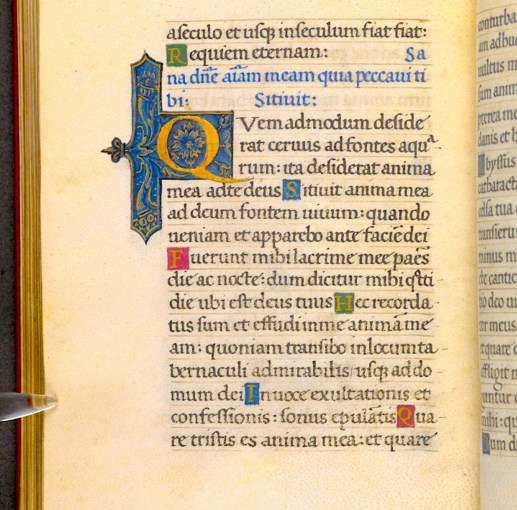 Y COLLEAGUE, Andrea Leal, sent to me something absolutely remarkable. It’s a “Book of Hours” containing Vespers of the Dead—but created with breathtaking attention to detail. Every letter, every accent, every illumination is far and away the most ornate version I’m aware of. I don’t know much about Vespers of the Dead, but I’m told it was often prayed by monks in addition to the office of the day. So it seems to have been a special prayer for someone who died, for benefactors, or for the holy souls in Purgatory. Bishop Fulton J. Sheen once exclaimed: “Have you noticed how uncomfortable modern man is with death? At a memorial service, he does not know how to extend condolences. The atheist has this world and nothing else.” Sheen was correct; our forefathers were much more comfortable with death.
Y COLLEAGUE, Andrea Leal, sent to me something absolutely remarkable. It’s a “Book of Hours” containing Vespers of the Dead—but created with breathtaking attention to detail. Every letter, every accent, every illumination is far and away the most ornate version I’m aware of. I don’t know much about Vespers of the Dead, but I’m told it was often prayed by monks in addition to the office of the day. So it seems to have been a special prayer for someone who died, for benefactors, or for the holy souls in Purgatory. Bishop Fulton J. Sheen once exclaimed: “Have you noticed how uncomfortable modern man is with death? At a memorial service, he does not know how to extend condolences. The atheist has this world and nothing else.” Sheen was correct; our forefathers were much more comfortable with death.
![]()
![]()

A wonderful excerpt from Archbishop Sheen:
Things were once seen as signs of outward expression of the unseen. […] The gargoyle peering from behind a pillar in a cathedral reminded us that temptations are to be found even in the most holy places. Our Blessèd Lord—on the occasion of His planned entrance into Jerusalem—said that if men withheld their praise of Him, “the very stones would cry out”—which they did as, later, they burst into Gothic Cathedrals. Now the stones are silent, for modern man no longer believes in another world; they have no story to tell, no meaning to convey, no truth to illustrate.
Memento mori.
![]()












